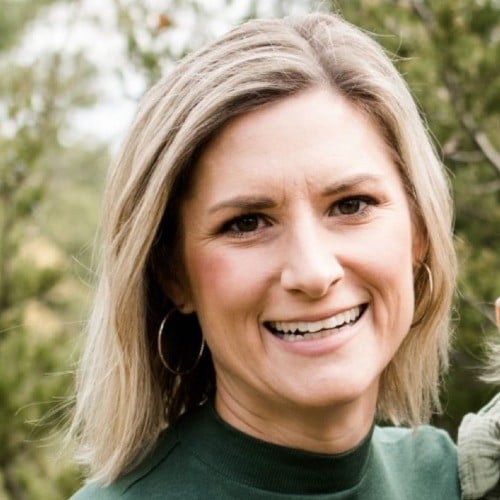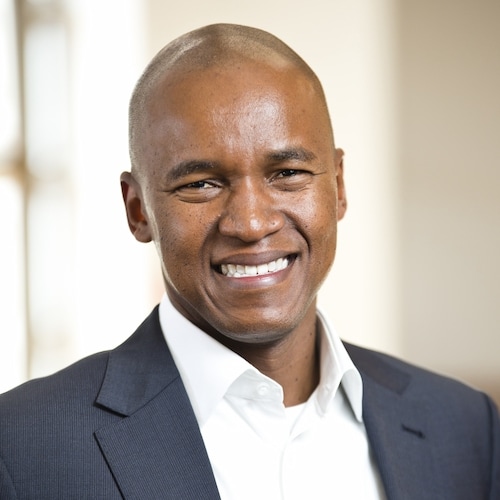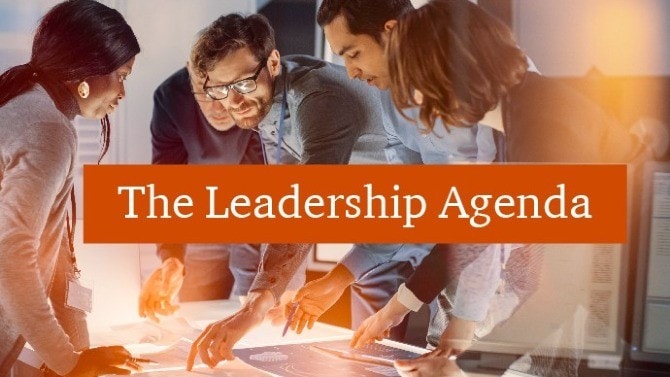Take on
Tomorrow
This special series of Take on Tomorrow explores PwC’s value in motion research, unpacking how the global economy will change over the decade ahead and what that means for business and society. We’ll delve into how business will navigate—and shape—the challenges and opportunities ahead, including emerging technology, climate impacts, and new ways of collaborating across industries.
Along the way, we’ll meet the innovators driving the efforts to tackle society’s greatest challenges and learn how businesses can capture the value that’s in motion and the exponential possibilities that come with it.
Listen and subscribe now on your favourite platform
How can CEOs sharpen their focus on the now and what’s next?
Confidence is down. Pressure is up. And CEOs are being asked to lead through more uncertainty than ever.
Take on Tomorrow is on the ground in Davos, Switzerland, at the World Economic Forum Annual Meeting, where Sarah von Fischer discusses key findings from PwC’s 29th Global CEO Survey—and what this year’s results could mean for the C-suite, and beyond. She’s joined by Dion Shango, Senior Partner, PwC Africa, and Agnes Koops, Global Vice Chair and Global Chief Commercial Officer, PwC, to explore why CEOs are losing confidence in short-term growth—even as they continue investing in AI, innovation, and other new opportunities.
Why are some companies pulling ahead while others struggle to turn AI into real results? And are today’s leaders spending their time on the right priorities to win both now...and later? Join us as we ask what it takes to lead with agility in the age of AI.
Listen and subscribe now on your favourite platform
SARAH VON FISCHER: Today’s leaders are being pulled in two directions at once.
They need a microscope to manage those immediate threats—and a telescope to spot the opportunities ahead.
But are CEOs finding the right balance?
Hello and welcome to Davos, Switzerland, and this special edition of Take on Tomorrow. I’m Sarah von Fischer.
Today, we’re going inside the mind of CEOs, as we explore the findings from PwC’s 29th Global CEO Survey, where we surveyed more than 4,400 CEOs around the world.
To help bring the findings to life, I’m so excited to be joined by Dion Shango, Senior Partner, PwC Africa.
DION SHANGO: Thank you, Sarah. Thank you for having me.
SARAH: So excited to have you here—and Agnes Koops, PwC’s Global Vice Chair, Global Chief Commercial Officer. Welcome to you, Agnes.
AGNES KOOPS: Good morning, Sarah.
SARAH: You know, Dion, I think one of the big parts of the survey that we all found was that CEO confidence in near-term growth is down year over year. You know, threats like cyber geopolitics is up.
DION: Yeah.
SARAH: So what do you think is driving this change?
DION: You are spot on, Sarah. CEOs are less confident about growth in their own organizations—at about 30%, down from 38% last year and the peak of about 56% in 2022. However, they still do have a fair degree of confidence about the outlook for the global economy. And indeed, the things that are keeping them awake at night—many CEOs [are] saying that they are really, really concerned that they’re not prepared for a cyber-risk-type attack on their organizations. So that’s keeping them awake. And certainly, macroeconomic volatility, and, of course, the uncertainty around global geopolitics, and where that’s going to land is something that is top of mind for them as well. Then of course, you know, the topic that everyone is talking about: AI. Are they moving fast enough? Are they investing sufficiently at scale? And when will they start seeing the returns coming through on their P&Ls?
SARAH: Agnes, you’ve been here in Davos for a few days now. So, what are you hearing from CEOs? Is this really aligned to what’s top of mind for them?
AGNES: Yeah. Yes, it does. So, there’s so much going on, and CEOs are also looking for a little bit of comfort. You can feel that in the conversations. They’re really curious to hear about the outcomes of the CEO Survey. I think maybe a little bit more than we, than I would have experienced previous years. So I think there’s a search for how, how do I get better informed? And I think that’s something that is part of all of this, because there’s so much—like the geopolitics, like AI—and how do I find my way together with my team in all of those challenges? And yeah, that’s what we are hearing, and that’s what you can feel almost when you are here.
SARAH: Dion, you know, our survey also looked at how CEOs are using their time. And respondents say they’re spending nearly 50% of their time on issues with less than a one-year horizon, and just 16% of time on long-term challenges, which is really interesting. So do you see this as a risk to spend so much time focused on those short-term issues?
DION: It certainly is a risk, and we’ve spoken about this idea of a CEO really having the ability to use a microscope and a telescope at the same time and strike that perfect balance between short-term and long-term issues. So what it does mean is that a CEO needs to think about their time as something that is a strategic asset of theirs and use that strategic asset with the same level of intensity, seriousness, as what they would with regards to capital allocation decision, talent acquisition, investment decision. And unfortunately, there is no playbook that will explain exactly how much time you spend on each particular topic. But you’ve just got to remember as a CEO that they’re all equally important.
AGNES: And Dion, can I ask you how are you doing that yourself? I was listening to you, and I thought, It’s a challenge for us as well.
DION: The thing that I struggle with the most, right? You say, as a leader, you have an open-door policy, but how much time do you spend sitting back—
AGNES: Yeah.
DION: —thinking strategically about the business? How much time do you spend analyzing external information and studying the environment in which you operate? How much time do you spend with clients and customers, right? So there is no right or wrong answer, but a CEO needs to do their best.
SARAH: You know, Agnes, one area where it doesn’t feel like CEOs are getting the balance quite right is around AI. I know we’ve mentioned this a little bit here in the show so far, but really interesting to me: The data showing about 12% are getting cost revenue benefits from AI now—significant cost and revenue benefits. But 56% are seeing neither. You know, I guess, first of all, was that surprising to you, and what can those who are maybe in that 56% do to catch up?
AGNES: To be fair, I don’t think it was a surprise, because we do see clients struggle with it. I had a conversation with a client, and I asked, this week, and I said, “So how far are you?” I said, “Well, we just started.”
DION: Mm-hmm.
AGNES: And I think, so how can you just get on the journey? Just get on board, get your foundations in order, you know, think about your technology, think about the culture that you have. Are you deploying AI in a responsible way? Do you have your risk management in order? So I think it’s really about thinking about this, making it work, and see it as a process maybe as well. Just go, reflect again, like you’re doing on the time issue. Also on this one, are you doing the right stuff to move it ahead? So, and what I learned yesterday, I found it really interesting as well, is that we tended to talk about cost. But there’s also a risk in it, because what’s really important is that the people in your organization are coming along with you on the journey. And when you talk about cost, they immediately are threatened by the feeling, What does it mean for me? So I think, we talk about our ROI—return on investment—I think it’s much more interesting to talk about revenue and revenue generation because of AI, because it is less scary also for the people in the organization that have to come on board with you. So I thought, Oh, that’s an interesting insight I got yesterday. So, a lot to do, I would say. But really, process step by step and really taking the fundamentals seriously.
DION: Yeah. I mean the CEOs that I’ve spoken to this week have also spoken about the importance of having the right mindset. If the mindset isn’t there, not only for the CEO themselves but for the immediate executive team—
AGNES: Yeah.
DION: —to really take everybody on that journey, then it will be a struggle to get to a place where you are ready to invest at scale and really unleash the power and the possibility of AI into your staff, your people, your organization, and be fearless about what will come next.
AGNES: Yeah. And I heard a CEO talk about what they did to make sure. So they really invested in a program for the whole company, for all of their employees. So they did, before and after, they did a, like, how are people feeling about it?
DION: Yeah.
AGNES: And it made such a big difference. Because people are just embracing AI.
DION: Exactly.
AGNES: And ready to get on with it.
SARAH: And I think, when the workforce can actually try it out and they see their leaders excited, then you can—
DION: Exactly.
SARAH: —see the benefits for yourself and for those around you—
DION: Yes indeed. Yes, indeed.
—which is interesting. And Dion, you know, you lead, PwC Africa. You’re in South Africa; you are in charge of our PwC Africa territories. So what about this part of the world? What is the pickup? What are you hearing from—maybe from the workforce and from CEOs?
DION: Yeah, certainly. There’s a continued narrative that Africa is probably punching a little bit below its weight in the sense that the continent has been blessed with this so-called demographic dividend, the youngest workforce of all continents, and what is seen to be the future global workforce for the world really. But at that, we still see insufficient investment coming into Africa. I attended a very interesting session yesterday where the talk was about: is there enough investment coming out of resources actually generated locally on the continent? Which was quite a nice mindset shift in terms of the thinking that says investment always has to come out from the outside into the continent. Then, certainly, the issue has been raised that Africa has shown such a strong track record of being able to leapfrog certain technological advancements. That this young population is mobile first. They are AI first. They are digital first. And so, Africa has the opportunity to actually lead the world in terms of embracing a lot of these advancements. So, lots of excitement about Africa. We just need to ensure the right leadership, the right policy frameworks, and ensure that we are able to attract investment at a steady rate.
SARAH: It’s exciting to think about that young workforce. Right?
DION: Absolutely.
SARAH: I think we forget about that.
DION: Yeah.
SARAH: And it’s so important.
DION: Yeah.
SARAH: Agnes, in this year’s survey, we’re also seeing CEOs that are moving into new sectors—
AGNES: Yeah.
SARAH: —really looking at innovation, rethinking innovation. You know, one of the stats was more than 40% of CEOs are actually moving into new sectors in the last five years, which is exciting. So what do you think about the timing on this? Why is this happening now? And what’s the greater impact?
AGNES: When CEOs are doing this, it also generates new revenue, new revenue streams. So I think it’s—technology is opening up new possibilities. For example, you know, the healthcare sector, technology sector, you know, the way that they can combine strengths. It’s just, it gives so much possibilities we cannot even always think about. So, CEOs are aware of the fact that they have to broaden their scope, and it pays off. That’s also what our research is showing.
DION: It’s such a factor that the CEOs who I’ve shared this particular trend with were actually quite impressed to hear that as much as 20% of revenues of those organizations that have branched out into other industries is coming from those new sources or new industries that they've explored into. And I think we’ll continue to see that trend grow even more.
AGNES: Yeah.
SARAH: It’s exciting for customers too. I mean, you think about your car turns into something that can monitor your health or the way we build is completely changing. So it’s really interesting.
AGNES: It’s exciting. But don’t you think it’s also a little bit scary sometimes? I think, you know, I’m driving, you’re used to, you’re just driving. But now you know, afterwards, maybe you get a full check on how you’re doing. “Hey, Agnes, you did not have a great start this morning.” You’re like, ”What?” So yeah, it is—it’s just a new world, right?
SARAH: We’ll meet in five years, Agnes. We’ll talk about it, and we’ll discover that it’s our everyday life when we don’t—
AGNES: It’s normal.
SARAH: —question or—exactly—
AGNES: Yeah.
SARAH: So what do you think the strongest CEOs are doing differently when it comes to getting this right? Allocating their attention? Doing it all?
DION: Yeah. Look, one thing is clear, Sarah. CEOs are feeling the pressure. But I think the best performing CEOs are adopting a very agile mindset. The best CEOs have realized that the days of having a five-year strategy that you announce once and then don’t talk about ever again are gone, quite frankly. A strategy has to have the ability to respond to unforeseen developments. It has to have the flexibility of being tweaked. Organizations need to be able to course correct, change direction at short notice. So it is those type of CEOs that are performing the best. These are CEOs who understand that they should draw help from everywhere where they can. And of course, collaboration, collaboration, collaboration. See where you can partner, see where you are, perhaps, lacking in expertise, and go where you need to, to get that.
SARAH: And really having to change your mindset a little bit. Sometimes you don’t like to change your plan.
DION: There you go.
SARAH: But you have to sometimes.
DION: Yeah. And knowing when to lead and when to follow as a CEO—very, very important.
SARAH: Finally, a question for both of you. You know, what is the big lesson from this survey, I guess, as we are looking forward to the rest of the year? Agnes, we can start with you.
AGNES: Well, so now I would say it’s around making sure that you are well informed, so that you find your way, and that you’re agile, that you are able to adapt all the time. But whether you are successful or not is not because of that part. But it’s because of how you externalize and make sure that you are following and that you are daring to step into new possibilities, and that you are making it work. And that is something that’s in your control. It could be tempting to think, Oh, there’s so much going on. You know, like, you can get frozen. But I think what’s really exciting almost is that you can get out of it just by, you know, looking at, OK, so how am I going to handle this? How am I,, is my boldness coming out of these times? So I think it’s really great that you can also move forward, move boldly forward together with your team and the people around you. So, like the partnering. So I would say, “Go ahead.”
DION: Yeah, I agree with that. Only thing I’d add is to say complexity and uncertainty are here to stay.
AGNES: Yeah.
DION: And there’s simply no such thing as business as usual anymore. No. That's a really important—
AGNES: Maybe this is usual, you know?
DION: Yeah. It’s really important for any leader or CEO to get that. I think, despite that, some of those traditional values of running any organization are important. The importance of building trust at every opportunity.
AGNES: Yes, definitely.
DION: Trust with stakeholders, regulators, trust with your people, trust with your customers and clients.
AGNES: Yeah.
DION: And so in all of this uncertainty, CEOs, organizations need to find a way of navigating the uncertainty in a way that makes sense for their own organization, in a way that will ensure that their organizations will continue to exist, or maybe not even just exist, but thrive ten years from now.
AGNES: Yeah. Nice. Nice. Well said, Dion. Yeah.
SARAH: I can’t, I can’t top that. So thank you both so much for joining us. Really appreciate the conversation, Iinsight. So interesting.
DION: Thank you, Sarah.
SARAH: Well, thanks so much for joining us on this special episode of Take on Tomorrow. To keep up to date on our season, follow Take On Tomorrow wherever you listen to podcasts. Or head to pwc.com/takeontomorrow.
COPYRIGHT MESSAGE
SARAH: Take on Tomorrow is brought to you by PwC’s strategy and business. PwC refers to the PwC network and/or one or more of its member firms, each of which is a separate legal entity.
Hosts

Sarah von Fischer
PwC
Guests

Dion Shango
Senior Partner, PwC Africa

Agnes Koops
Global Vice Chair and Global Chief Commercial Officer, PwC
All episodes in the series

The strategy+business digital issue
In-depth analysis, quick-hit summaries, interactive data, and visual storytelling to inform and inspire the C-suite.

The Leadership Agenda
Sharp, actionable insights curated to help global leaders build trust and deliver sustained outcomes.
Value in motion
AI, climate change and geopolitical shifts are reconfiguring the global economy. We’ve mapped where value is moving over the next decade, so you can build a future-ready business to capture it.
The Leadership Agenda
Sharp, actionable insights curated to help global leaders build trust and deliver sustained outcomes.
Contact us

© 2017 - 2026 PwC. All rights reserved. PwC refers to the PwC network and/or one or more of its member firms, each of which is a separate legal entity. Please see www.pwc.com/structure for further details. This content is for general information purposes only, and should not be used as a substitute for consultation with professional advisors.











